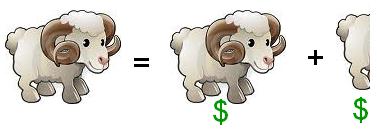Chapter Five: Fraud, uncleanliness and other minor offenses
It's hard out here for a sheep.
In chapter four, we learned the basic rule of atonement: You break a commandment, you must atone for it. It usually involves sacrificing a sheep, unless everyone in the community breaks a commandment, in which case you sacrifice a bull. Kill a man? Sacrifice a sheep. Steal from your neighbor? Sacrifice a sheep.
But what if you break a commandment without knowing it? What if you commit a crime not covered under the commandments, like defrauding a neighbor or touching a pig?
It turns out there are extra crimes which also require a sacrifice for full atonement. Five of these crimes and their punishments are explained in epic detail in chapter 5 of Leviticus:
Crime #1: You become unclean – by touching an unclean animal, the carcass of an unclean animal, or any human uncleanliness.
Atonement: Bring a female sheep to a priest to sacrifice on your behalf. If you can’t afford a sheep, bring two turtledoves or pigeons. If you can’t afford those birds, bring some flour.
Crime #2: You utter an oath – no matter what kind of oath.
Atonement: Bring a female sheep to a priest to sacrifice on your behalf. If you can’t afford a sheep, bring two turtledoves or pigeons. If you can’t afford those birds, bring some flour.
For reference, the sacrificial conversion table for these crimes is:

One Sheep = Two turtledoves or pigeons, but only if you can’t afford the sheep = Some flour, but only if you can’t afford the birds.
Crime #3: You “commit a trespass and sins unintentionally in any of the holy things of the LORD”
Atonement: Bring a Ram to a priest to sacrifice on your behalf. You can also pay the priest the current market value of a Ram plus one-fifth.
Crime #4: You break a commandment but do not realize that you broke the commandment.
Atonemet: Once you’ve realized you’ve broken the commandment, bring a Ram, “or its equivalent,” to a priest to sacrifice on your behalf.
I’ve developed this diagram to help you remember your ram sacrifice equivalence:

One Ram = The market value of one ram plus 1/5th
Crime #5: You defraud a neighbor, rob from a neighbor, found something and lied about it or deceived a neighbor “in a matter of deposit or pledge”
Atonement: You must pay back whatever was defrauded or robbed plus 1/5th its value. Then, you must sacrifice a Ram or bring “its equivalent” to the priest.
“Now wait a minute,” you might be asking. “Isn’t stealing already covered by the eighth commandment and therefore forgiven with a regular old sheep sacrifice? Why is there a separate atonement for robbery and fraud? Did the rules change, or is this just a clarification?” You are wise, young grasshopper, but you do not understand because one cannot understand the mind of the LORD!
27 Trackbacks/Pingbacks
.…
ñïñ!…
.…
tnx….
.…
ñïñ!!…
.…
áëàãîäàðþ….
.…
tnx!…
.…
ñïàñèáî!!…
.…
ñïàñèáî!!…
.…
ñïàñèáî çà èíôó!…
.…
tnx….
.…
ñýíêñ çà èíôó….
.…
ñïàñèáî çà èíôó….
.…
áëàãîäàðåí!!…
.…
tnx for info!…
.…
good….
.…
ñïàñèáî çà èíôó!…
.…
ñýíêñ çà èíôó!!…
.…
ñïàñèáî çà èíôó!!…
.…
ñïñ….
.…
áëàãîäàðåí….
.…
tnx for info!!…
.…
thanks for information!!…
.…
tnx for info!…
.…
ñïàñèáî çà èíôó….
.…
good info!!…
.…
good….
.…
thank you….
.…
áëàãîäàðåí!…
Post a Comment